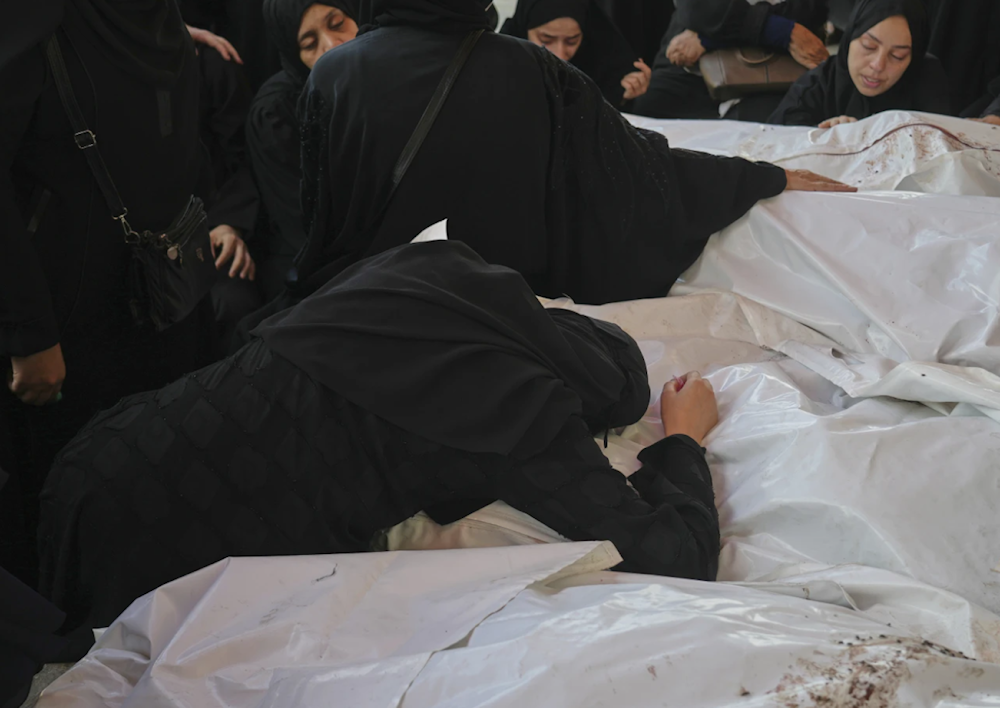Gaza rescue teams paralyzed by fuel crisis, death toll mounts
The United Nations issues a stark warning that fuel shortages in the Gaza Strip have reached "critical", life-threatening levels.
-

Mourners attend the funeral of their relatives who were killed in an Israeli bombardment in Deir al-Balah, on July 12, 2025 (AP)
In the past few hours only, Israeli indiscriminate bombing has killed and injured many Palestinians in the Gaza Strip. An Israeli strike targeting a group of civilians in the al-Shati Camp in western Gaza City killed and wounded many.
20 were reported missing in an Israeli airstrike on two homes in Jabalia al-Nazla, northern Gaza Strip, according to Al Mayadeen's correspondent.
Injuries were reported from Israeli drone fire near the Public Security Junction in western Gaza City.
Four were killed in Israeli shelling on the neighborhoods of Bani Suheila, Sheikh Nasser, and al-Balad in Khan Younis, southern Gaza Strip.
Read more: 26 Palestinians killed in latest wave of Israeli bombings on Gaza
Aid seekers selected
Two were killed in an afternoon Israeli strike targeting aid seekers in western Gaza City. Another strike on the northwest of Gaza City killed four.
Rising toll
Earlier today, the Palestinian Ministry of Health in Gaza announced that hospitals received the bodies of 59 martyrs, including nine retrieved from under the rubble, and 208 injuries over 24 hours. Many victims remain trapped beneath debris and along roads, unreachable due to continued bombardment.
Since October 7, 2023, as of June 16, 2025, the death toll of the Israeli genocide in Gaza has surged to 57,882 Palestinians killed and 138,095 injured.
Since March 18, 2025, the total toll has risen to 7,311 killed and 26,054 wounded.
Moreover, as the Israeli-made famine looms over Gaza, 17 starved Palestinians were killed since early morning and over 53 were injured while trying to receive aid at designated "aid distribution sites" and were later transported to hospitals, as per the Ministry's report.
The death toll among Palestinians killed while seeking food aid in designated distribution zones has now climbed to 805, with more than 5,252 others wounded, according to the report.
'Critical' fuel shortages in Gaza, UN warns
The United Nations issued a stark warning on Saturday, stating that fuel shortages in the Gaza Strip have reached "critical levels", exacerbating the suffering in the war-torn Palestinian territory.
Seven UN agencies, in a joint statement, emphasized that "fuel is the backbone of survival in Gaza," essential for powering hospitals, water and sanitation systems, ambulances, and all aspects of humanitarian efforts. They also highlighted the importance of fuel for bakeries, which are crucial for food production.
Gaza has been grappling with severe fuel shortages since the Israeli occupation has unleashed its brutal siege and aggression on the strip, with the situation becoming more dire now than ever as UN agencies, including the World Health Organization, the World Food Programme, and OCHA, warn that the fuel crisis has reached critical levels.
"After almost two years of war, people in Gaza are facing extreme hardships, including widespread food insecurity," the agencies said. "When fuel runs out, it places an unbearable new burden on a population teetering on the edge of starvation."
The UN further stated that without sufficient fuel, humanitarian organizations working in Gaza, where large swaths have been devastated by Israeli airstrikes and famine threats loom, will likely be forced to cease operations entirely.
Most vulnerable being pushed to 'brink of death'
"Without fuel, bakeries and community kitchens cannot operate. Water production and sanitation systems will shut down, leaving families without safe drinking water, while solid waste and sewage pile up in the streets," the statement added.
"These conditions expose families to deadly disease outbreaks and push Gaza’s most vulnerable even closer to death," the agencies warned.
This alert follows the UN's recent achievement of delivering fuel to Gaza for the first time in 130 days. While it was a "welcome development", the agencies emphasized that the 75,000 liters of fuel brought in represent only a fraction of the needed fuel to maintain essential services and humanitarian operations.
"The United Nations agencies and humanitarian partners cannot overstate the urgency of this moment," the UN agencies and their humanitarian partners stated.
"Fuel must be allowed into Gaza in sufficient quantities and consistently to sustain life-saving operations."

 4 Min Read
4 Min Read










